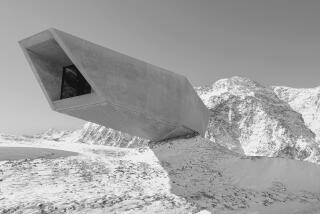‘Drawing for Architecture’; ‘A Village Life’
- Share via
Drawing for Architecture
Léon Krier
Foreword by James Howard Kunstler
The MIT Press: 232 pp., $24.95
These ideograms and doodles, writes architect Léon Krier, came to him in short “angry bursts.” At first glance, they seem playful, witty, Steinberg-esque commentaries on the perils of modern architecture, urban imbalance, petroleum addiction and overconsumption. But many show the deformation of the human body and spirit, the triumph of stupidity, the flabby shapelessness of the inauthentic and the disastrous consequences of abandoning the human scale.
Krier’s anger builds noticeably: He says his intention “was not to console or please but to reveal scandalous elements of architectural practices and ideology.” In many cases, it is clear that what lies at stake is the difference between “fulfilled” and “frustrated lives.”
Krier believes in the rightness of classical architectural elements. A door should be a door, not a “so-called” door. A cottage should be the size of a cottage, not, as we might say today, a McCottage. His drawings speak (I should say shout) volumes about hubris and our tendency to fall in love with the new -- new materials, styles and a desire to re-create the old, to make it vernacular. Then again, some are pure fun, with witty titles such as “Compulsive Commuting,” “Anti-City,” “Maximum Distance for Minimum Achievement,” “Homo Industrialis” and “Don’t Forget Your Gravity Check” (for super-sized projects).
A Village Life
Poems
Louise Glück
Farrar, Straus and Giroux: 72 pp., $23
In the framed world of these poems, the stages, landscapes of life and love are quietly regarded. They give us the Edenic period before firsthand knowledge of sex, and of life after sex, when the body remembers how it once felt.
These are contemplative poems, in which once-burning stars and planets are reflected in water. Views are contained by windows; village life is contained by avenues, piazzas; relationships are contained by habits over time. The young sit in the fountains, the elderly at a discreet distance.
“To get born, your body makes a pact with death, / and from that moment, all it tries to do is cheat -- “ she writes in “A Slip of Paper.” And yet these are not death poems, as one critic has said. Just a passing over a threshold: “My body, now that we will not be traveling together much longer / I begin to feel a new tenderness toward you, very raw and unfamiliar, / like what I remember of love when I was young.” These are autumn poems, with all its wisdom and promise. “So for a while it seems possible / not to think of the hold of the body weakening, the ratio / of the body to the void shifting, / and the prayers becoming prayers for the dead.”
More to Read
The biggest entertainment stories
Get our big stories about Hollywood, film, television, music, arts, culture and more right in your inbox as soon as they publish.
You may occasionally receive promotional content from the Los Angeles Times.










